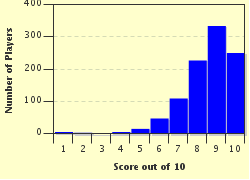Quiz Answer Key and Fun Facts
1. In 1535, Henry VIII of England introduced a tax on beards. Few people could have predicted that later, 170 years later to be exact, another ruler would also institute a beard tax, but he did. Who was it?
2. Thomas Jefferson, third President of the United States of America, was a well-known cultivator of hemp. It would have been difficult for Jefferson to imagine that, more than one hundred and fifty years after his death, another man who became President would be involved in a controversy around smoking the very same kind of plant. Who was this twentieth-century man who, after a while, admitted the deed but claimed that he 'did not inhale'?
3. In 1899, Charles H. Duell of the US Patent Office is often said to have claimed: "Everything that can be invented, has been invented". A while later that prediction was proved very wrong. Approximately how many patents did the US Patent Office grant in 1999, one hundred years after Duell's forecast?
4. In 1919, baseball Hall of Famer Tris Speaker offered the following appraisal of a strategic change regarding a famous player: "Taking the best left-handed pitcher in baseball and converting him into a right fielder is one of the dumbest things I ever heard." After a while, Speaker was proven wrong, but about whom was he speaking?
5. On October 16, 1929, a Yale Economics professor announced: "Stocks have reached what looks like a permanently high plateau." In a very short while the stock market crashed, triggering what notorious phenomenon of the 1930s?
6. In 1936 the 'New York Times' predicted: "A rocket will never be able to leave the Earth's atmosphere." After a while this was proven wrong. By 1946 US scientists had launched rockets beyond the Earth's atmosphere and eventually they were used to propel people into space. In what year did rockets successfully land man on the moon?
7. On September 30, 1938, British Prime Minister Neville Chamberlain reported to his nation that he had signed the Munich pact and announced: "This is the second time in our history that there has come back from Germany to Downing Street peace with honour." What famous phrase, shown to be an inaccurate prediction after a very short while, did he deliver next?
8. On December 4, 1941, the US Secretary of the Navy, Frank Knox, declared: "Whatever happens, the US Navy is not going to be caught napping." A VERY short while later, three days to be precise, a large naval contingent was caught doing that very thing by a Japanese attack force at which location?
9. In 1964 this actor was turned down for the lead in a movie because it was deemed he didn't 'have that presidential look'. After a while, it became apparent that the American public disagreed, because he was elected the 40th President of the United States. Who was he?
10. Even those who were intimately involved in the computer revolution could not make predictions that seemed accurate for much of a while. Which software magnate is alleged to have declared, in 1981, that "640k ought to be enough for anybody"?
Source: Author
looney_tunes
This quiz was reviewed by FunTrivia editor
bloomsby before going online.
Any errors found in FunTrivia content are routinely corrected through our feedback system.

